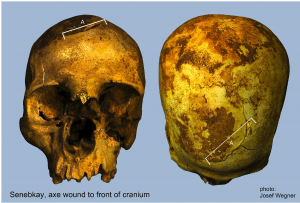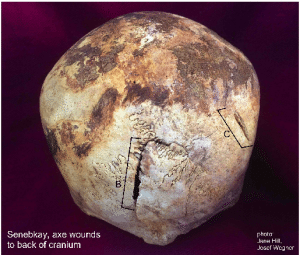
In collaboration with the Ministry of Antiquities, a University of Pennsylvania team discovered new evidence on the life and death of pharaoh Senebkay, founder of the 16th Dynasty of the Second Intermediate Period of Egypt. The pharaoh’s skeleton’s forensic analysis performed by researchers directed by Dr. Josef Wegner indicated that the reason behind the death of this king was due to a number of wounds received during a fierce battle from multiple assailants or an ambush. The skeleton was found by the Pennsylvania mission in 2014 inside the King’s tomb in Abydos, Suhag Governorate, declared Dr. Eldamaty, Egypt’s Minister of Antiquities.
The analysis shows that the king received eighteen wounds reaching his bones including major cuts to his feet, ankles and lower back. There are also a number of blows at the skull which give us some ideas about the shape and type of battle axes and weapons used during that time. Also the angle and direction of the King’s wounds imply that he was in an elevated position (may be on horseback or on a chariot) relative to his attackers. The assailants probably wounded his lower part first (feet, ankles and lower back) in order to drag him on the floor then finished him with axe blows to the skull.

The General Manager of the Suhag Archaeological Area, Gamal abdel Nasser added that the king Senebkay (whose name means “my spirit is healthy”) was mentioned in the Turin Papyrus with the name “User Re” and he belongs to the short-lived Abydos Dynasty dating ca. 1650-1600 BC. The Abydos dynasty was a local dynasty that ruled during the reign of the Theban Dynasty and the Hyksos rulers.
The new results suggest that Senebkay might be the first Egyptian king who died in battle, because the only Egyptian King previously known to have died in battle is the 17th Dynasty king Seqnenre Tao whose remains are now at the Cairo Museum.
Via Ministry of Antiquities (Egypt) via Past Preservers

